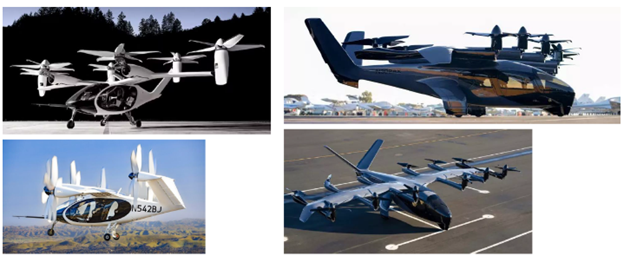How Warren Buffett Privately Traded in Stocks That Berkshire Hathaway Was Buying and Selling; EHang short report; Plug Power collapses; Greetings from Cape Town
1) In 2021, someone leaked a massive trove of IRS tax information on thousands of the wealthiest Americans to investigative journalism organization ProPublica, which it's used to publish numerous stories: The Secret IRS Files.
Last week, ProPublica published this article based on analyzing roughly two decades of Warren Buffett's personal trades: How Warren Buffett Privately Traded in Stocks That Berkshire Hathaway Was Buying and Selling. Excerpt:
Buffett has long said such trading would be a conflict of interest, and Berkshire policies prohibit it. But confidential records show that, on at least three occasions, he sold millions of dollars of shares in stocks that Berkshire was trading.
I was hoping ProPublica would publish more details, as seeing Buffett's personal trades would be like finding the holy grail for value investors and longtime Buffett followers like me:
It has long been known that Buffett keeps a personal stock portfolio, separate from his company's holdings. But what's inside of it has always been a closely guarded secret. Buffett's hand-picked biographer, Alice Schroeder, told ProPublica that he gave her access to nearly everyone and everything in his life – except his personal investing records.
Unfortunately, it's a brief, mostly "gotcha" article. It reveals that over two decades, Buffett, who's worth more than $100 billion, sold at least $466 million in stocks in his personal account. (Investors only have to report stock sales, which trigger realized gains or losses, to the IRS, not all trades.)
Of these, ProPublica identified three of Buffett's sales that appeared inconsistent with what he was saying publicly or the trading he was doing with Berkshire Hathaway's (BRK-B) massive stock portfolio.
My overall reaction? Yawn.
There is zero chance that Buffett was frontrunning Berkshire or misleading his followers to make (or save) a microscopic amount of money in his personal account.
This contrasts with what David Sokol – who was at one time believed to be Buffett's successor – did. Sokol bought a meaningful stake in then-public Lubrizol and then pitched it to Buffett without disclosing his position... and then profited when Buffett bought the company.
Intentions matter...
At worst, Buffett was a little sloppy. He speaks publicly and makes trades so often that, on three rare occasions, he likely forgot that a trade in his personal account might appear inconsistent.
He declined to comment to ProPublica, but I hope he issues a statement clearing this up so we can all forget about it.
2) The stock of EHang (EH), a Chinese maker of electric vertical and takeoff ("eVTOL") aircraft, got caught up in the meme-stock craze two and a half years ago.
Shares soared more than 10 times to over $100 per share. Then, like every other meme stock, it crashed. It fell below $4 a year ago, but since then has rebounded to today's level around $13, giving it a $785 million market cap.
This is a sector I know a good bit about thanks to half-day tours I took in California of the two market leaders, Joby Aviation (JOBY) and Archer Aviation (ACHR). Here are pictures of the eVTOLs they're developing (Joby left, Archer right):

I'll write more about these companies later, but I was extremely impressed with what I saw.
That said, anytime a sector gets hot, a lot of lame and/or fraudulent companies rush to go public to cash in on the bubble.
EHang appears to be one of them, based on this in-depth report that top activist short seller Nate Anderson of Hindenburg Research released last week: EHang: Hollow Order Book And Fake Sales Make This China-Based eVTOL Company Last In Line For Takeoff. Excerpt:
- EHang is a $903 million market cap, China-based, Nasdaq-listed electric vertical take-off and landing ("eVTOL") aircraft company.
- The company's share price has surged more than 267% over the last year due to market excitement over eVTOL companies, a recently granted aircraft design certification from the Chinese government, and a 1,300+ unit pre-order book, suggesting imminent largescale revenue.
- EHang has generated net losses since inception and currently trades at ~50.3x its tangible book value, a significant premium to competitors Joby Aviation (4.1x) and Archer Aviation (5.0x). Despite its premium valuation, EHang's flagship aircraft is outmatched by competitors on key performance metrics.
- Aircraft manufacturing is a matter of life and death. Yet EHang has operated on a shoestring budget relative to peers, investing just $97.4 million in cumulative R&D, while competitors Joby and Archer Aviation have invested $761.9 million and $381.1 million, respectively.
- EHang's competitors have hundreds of millions in cash, while EHang has only $44.9 million left, representing limited runway in the capital-intensive aviation industry.
- Short on cash, in July 2023 EHang announced a $23 million capital raise led by a South Korean music producer who was previously put on an INTERPOL wanted list and sentenced to 2 years in prison for embezzling from a Korean company he founded, according to media reports.
- EHang's much-touted, recently granted certification comes with numerous flight restrictions that it has failed to fully disclose to investors. The restrictions invalidate the bulk of its potential commercial use cases, including restrictions against flying in densely populated areas, in shared airspace, and out of sight of a ground crew.
- EHang claims restrictions will be progressively lifted, but according to China-based eVTOL experts, EHang's flagship aircraft would need a billion-dollar redesign and an entirely different class of certification to avoid the limitations.
- We found that 92+% of EHang's claimed 1,300+ unit preorder book is based on "dead" or "abandoned" deals, failed partnerships, and newly-formed customer entities with no discernible operations.
- EHang's largest deal is a 1,000-unit preorder from one of its pre-IPO investors, a biotech company called United Therapeutics, which represents ~74% of EHang's total preorders. The deal was initially signed in 2016.
This smells like an obvious fraud and the stock will soon be below $1. Avoid it at all costs.
3) Along the same lines, more than a decade ago, I correctly identified hydrogen power company Plug Power (PLUG) as nothing more than a stock promotion (albeit one of the longest-running ones I've ever seen).
I successfully shorted it after it soared from less than $1 to nearly $10 in 2014.
It then collapsed back to around $1 and the company limped along, issuing massive amounts of stock to gullible investors to stay alive. (The share count has risen from 13 million in 2010 to 605 million today – now that's dilution.)
And then it got caught up in both the meme-stock and alternative-energy bubbles and soared to over $70 at the same time EHang peaked, briefly giving it a market cap above $40 billion.
It may well have been the most ridiculously overvalued of all the meme stocks, which is why I added it to my "Meme Stock Bubble Basket" and, later, to my "Dirty Dozen Stocks to Avoid."
It has, of course, completely collapsed, closing Friday at $3.53, down 40% on the day after posting weaker-than-expected results and issuing a "going concern" notice regarding its potential inability to fund operations over the next year.
Don't be tempted to bottom-fish this one: Because of its massive share count, it still has a $2.1 billion market cap, which is going to continue shrinking.
4) Greetings from Cape Town, South Africa, one of my favorite cities – it's stunningly beautiful.
My youngest daughter Katharine just finished a wonderful semester abroad at the University of Cape Town, so we flew here overnight on Friday, had a wonderful day and a half, and are now on our way to Namibia for a week, followed by a week in Botswana!

Best regards,
Whitney
P.S. I welcome your feedback – send me an e-mail by clicking here.